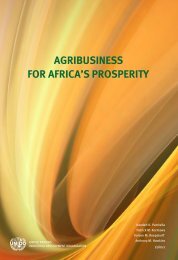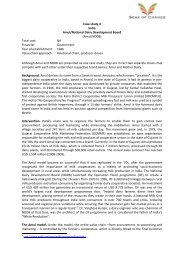Collection of Case Studies 2. - Seas of Change Initiative
Collection of Case Studies 2. - Seas of Change Initiative
Collection of Case Studies 2. - Seas of Change Initiative
Create successful ePaper yourself
Turn your PDF publications into a flip-book with our unique Google optimized e-Paper software.
c<strong>of</strong>fee plantations were sold at dump prices on the local markets. This situation changed when the c<strong>of</strong>feeproduction did not result in sufficient income for the farmers and their families, in part due to plummetinginternational c<strong>of</strong>fee prices.Hence, FAPECAFES looked for chain improvements with the help <strong>of</strong> Ethiquable. Together they looked into thec<strong>of</strong>fee cultivation process and they explored the option <strong>of</strong> commercialising plantain, which grows in between thec<strong>of</strong>fee plants. ETHIQUABLE identified the plantain chips first, because <strong>of</strong> market demand. Afterwards, theystudied the production’s conditions.This commercialisation started both on the domestic and international markets. Especially for the internationalmarkets, the organisations aim to meet the growing demand for fair trade and ecological products, such aschips.Approach and actions <strong>of</strong> FAPECAFESTo answer the many challenges for plantain producing c<strong>of</strong>fee farmers, FAPECAFES has sought support <strong>of</strong> outsideactors to improve its institutional capacity in developing the plantain chain. These are, among others, Ethiquable(which has focused on the wholesale and retail <strong>of</strong> plantain chips from the processing plant to consumers) andVECO Andino (which collaborates with FAPECAFES on the value chain from cultivation to processing).For the period <strong>of</strong> 2010-2013, FAPECAFES has planned actions to improve the plantain production chain’ssustainability (economic, environmental, socio-cultural and institutional).Since the initiative is still running, there is no impact measured, nor can we conclude on key implications forscaling inclusive business. The following section therefore sums up the actions <strong>of</strong> FAPECAFES to contribute todifferent forms <strong>of</strong> sustainability.5. Actions <strong>of</strong> FAPECAFES contributing to sustainabilityActions <strong>of</strong> FAPECAFES contributing to Economic SustainabilityIncrease farmers’ incomeThe main objective <strong>of</strong> the interventions is to consolidate the plantain value chain and improve the income <strong>of</strong> thefarmer families associated with FAPECAFES. This includes developing technical and commercial strategies toincrease storage and processing capacity, improve the product’s quality and boost sales on the domestic andinternational markets. There is a big focus on capacity development <strong>of</strong> the grassroots organizations andFAPECAFES, be it via workshops, consultancies or technical assistance to improve the plantain chain, fromcultivation to commercialisation. The production <strong>of</strong> chips provides c<strong>of</strong>fee farmers with an extra income, althougha considerable part <strong>of</strong> their production goes to low price channels. Finding new markets for their products will bekey in sustaining an increase in the farmers’ income.Develop long term relationships in organic and fair trade marketsFurthermore, technical, administrative and commercial capacities <strong>of</strong> the grassroots organisations and <strong>of</strong>FAPECAFES need to be strengthened, to ensure long term organisational and financial sustainability. Specialattention will be devoted to develop long term commercial relationships in the markets <strong>of</strong> organic and fair tradeproducts. Therefore, with the facilitation <strong>of</strong> VECO Andino, the organisation works on the creation and functioning<strong>of</strong> a Plantain Management Committee for the southern part <strong>of</strong> the Ecuadorian Amazon region, to create inter- andintra-regional partnerships and strengthen the bargaining position <strong>of</strong> plantain producers on a commercial andpolitical level.Actions <strong>of</strong> FAPECAFES contributing to Environmental SustainabilityPromotion <strong>of</strong> organic farmingFAPECAFES seeks to promote a sustainable agriculture chain for plantain through diversification in productionand cultivation <strong>of</strong> crops according to the standards <strong>of</strong> organic farming. In this respect, a proposal will bedeveloped for technical assistance and technology transfers for sustainable plantain farming. FAPECAFES isexploring options for a technical service (consultancies <strong>of</strong> private companies) supporting farmers in theproduction <strong>of</strong> plantain using a sustainable agriculture approach.58







